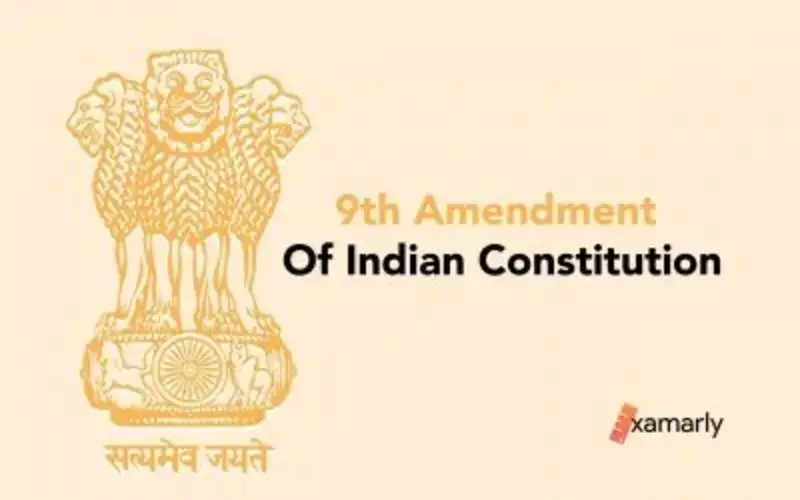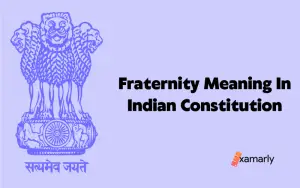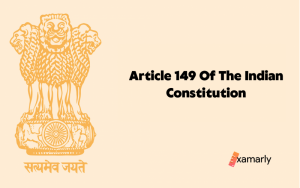As stipulated in the Indo-Pakistan Agreement, the 9th Amendment of the Indian Constitution made it easier for India to cede the land of the Berubari Union to Pakistan.
The problems regarding some enclaves and frontiers of the provinces of Assam, West Bengal, Punjab, and the Union Territory of Tripura were of concern to Nehru and Noon. As a result, Pakistan and India inked a contract.
Several boundary conflicts were resolved by agreements between the governments of both India and Pakistan. It was dated 10 September 1958, 23 October 1959, and 11 January 1960.
This amendment addressed a critical issue related to the transfer of Indian territory to foreign nations and clarified the extent of Parliament’s power to reduce the area of a state.
In this blog, we will explore the details of the 9th Amendment of the Indian Constitution and its impact on the legal and political landscape of India. We have curated important information about the 9th Amendment of the Indian constitution exclusively for UPSC aspirants.
- Importance of Constitutional Amendments in India
- 9th Amendment of the Indian Constitution
- Nehru-Noon Agreement
- Role of Lok Sabha in the 9th Amendment of the Indian Constitution
- Reason for the 9th Amendment Act of 1960
- Important Provisions
- Significance of 9th CAA
- Key Points – 9th Amendment of the Indian Constitution.
- Conclusion
- Frequently Asked Questions
- What Is The Significance of the 9th Amendment of the Indian Constitution?
- What is the 9th Amendment of the Indian Constitution?
- Why was the 9th Amendment of the Indian Constitution necessary?
- What is the process for amending the Indian Constitution?
- How many times has the Indian Constitution been amended?
- What is the role of Parliament in amending the Indian Constitution?
- Can the Indian Constitution be amended by the states?
- What is the importance of the Indian Constitution?
- What are the fundamental rights guaranteed by the Indian Constitution?
Importance of Constitutional Amendments in India
- The Indian Constitution is a living document that requires amendments to adapt to the changing needs of society.
- Constitutional amendments are essential to ensuring that the Constitution remains relevant and effective in addressing the challenges and issues facing the country.
- The process of amending the Constitution provides an opportunity for debate and discussion, allowing for a diverse range of perspectives to be heard and considered.
- Constitutional amendments can help to address historical injustices and provide for greater representation and inclusion of underrepresented groups.
- Amendments can also serve to enhance the fundamental rights and freedoms of citizens, providing greater protections against abuse of power and discrimination.
- In some cases, constitutional amendments may be necessary to address unforeseen circumstances or to correct unintended consequences of previous amendments.
- Constitutional amendments play a critical role in shaping the legal and political landscape of the country and can have a significant impact on the lives of citizens.
- Overall, constitutional amendments are essential to ensuring that the Indian Constitution remains a dynamic and responsive framework for governance that reflects the values and aspirations of the Indian people.
9th Amendment of the Indian Constitution
To give effect to the resolution of boundary/territorial conflicts between India and Pakistan, the 9th Amendment Act was initiated.
It was in the years 1958, 1959, and 1960. In light of this, certain territories were handed to Pakistan following mutual discussion. The Indian and Pakistan governments agreed to various terms.
In pursuance of the India-Pakistan agreement, the Berubari Union was divided horizontally. It parted from the northeast corner of Debiganj Thana.
This amendment also led to the settlement of various boundary issues. The regions of Punjab, West Bengal, and Assam, along with the Union territory of Tripura, were implicated in it.
Detailed Analysis of the 9th Amendment of the Indian Constitution
The 9th Amendment Act of the Indian Constitution contains definitions of certain key terms used in the Act. These definitions are as follows:
(a) “Appointed day” refers to the date appointed by the Central Government, which is notified in the Official Gazette. This is the date on which the transfer of territories to Pakistan takes place, by the Indo-Pakistan agreements. The territories to be transferred are demarcated for this purpose and referred to in the First Schedule. Different dates may be appointed for the transfer of territories from different Indian states and the Union territory of Tripura.
(b) “Indo-Pakistan agreements” refer to the agreements entered into between the Governments of India and Pakistan on the 10th day of September 1958, the 23rd day of October 1959, and the 11th day of January 1960. The relevant extracts of these agreements are set out in the Second Schedule of the 9th Amendment Act.
(c) “Transferred territory” refers to those territories that are demarcated in the First Schedule of the Indo-Pakistan agreements and are to be transferred to Pakistan by these agreements.
Similar Posts:
- 62nd Amendment Of Indian Constitution
- 95th Amendment Of Indian Constitution
- The 68th Amendment Of Indian Constitution
Nehru-Noon Agreement
When the disputed area was still part of East Pakistan in 1958, Jawaharlal Nehru and Feroze Khan Noon, the Pakistani prime minister, settled.
- India and Pakistan agreed to the exchange of the regions.
- The horizontal division of the Berubari Union 12 was to take place.
- It is necessary to carry out an enclave for Enclave to avoid any territory losses.
Role of Lok Sabha in the 9th Amendment of the Indian Constitution
The Lok Sabha, which is the lower house of the Indian Parliament, played a significant role in the enactment of the 9th amendment of the Indian Constitution.
The amendment was introduced in the Lok Sabha in 1960 by the then Home Minister, Lal Bahadur Shastri, and was subsequently passed by the house after a thorough debate and discussion.
The 9th amendment addressed the issue of ceding Indian territory to foreign nations, which had become a contentious issue at the time.
The Lok Sabha played a crucial role in shaping the amendment and ensuring that it reflected the interests and concerns of the Indian people.
Once the Lok Sabha had passed the amendment, it was sent to the Rajya Sabha, the upper house of the Indian Parliament, for further review and approval.
After the Rajya Sabha passed the amendment, it was sent to the President of India for assent, and it became law after receiving his approval.
Overall, the Lok Sabha played a critical role in the passage of the 9th amendment, reflecting its importance as a legislative body and its commitment to upholding the Indian Constitution.
Reason for the 9th Amendment Act of 1960
The Nehru-Noon agreement proposed the division of the Berubari Union’s territory between India and Pakistan.
However, the West Bengal government did not agree to this agreement. Subsequently, the matter was taken to the Supreme Court, which declared that the transfer of Indian territory to a foreign country is not within Parliament’s authority to reduce a state’s area, as outlined in Article 3 of the Indian Constitution.
Therefore, a constitutional amendment under Article 368 was required to transfer Indian territory to a foreign nation.
The 9th Amendment of the Indian Constitution was enacted in 1960 to give effect to the Indo-Pakistan agreements and to resolve the boundary disputes between the two nations.
The amendment facilitated the transfer of certain territories to Pakistan, as per the terms of the agreements.
Important Provisions
By a statute related to article 368 of the Constitution, the First Schedule was altered to reflect the transfer of these lands.
The 9th Amendment of the Indian Constitution was enacted in the year 1960 to give effect to the Indo-Pakistan agreements and to settle the territorial disputes between the two nations. The important provisions of the 9th Amendment are:
- The amendment provides for the appointment of a date by the Central Government, notified in the Official Gazette, for the transfer of territories to Pakistan, as demarcated and referred to in the First Schedule.
- The amendment refers to the Indo-Pakistan agreements, which means the agreements entered into between the Governments of India and Pakistan, dated 10th September 1958, 23rd October 1959, and 11th January 1960.
- The amendment defines the “appointed day,” which is the date of the transfer of the territories to Pakistan. Different dates may be appointed for the transfer of territories from different states and the Union territory of Tripura.
- The amendment defines the “transferred territory,” which refers to the territories comprised in the Indo-Pakistan agreements and demarcated for the purpose of being transferred to Pakistan.
- The 9th Amendment of the Indian Constitution stipulates that ceding Indian territory to a foreign nation requires a constitutional amendment under Article 368.
The 9th Amendment enabled the transfer of certain territories to Pakistan, as per the terms of the Indo-Pakistan agreements, and facilitated the resolution of the boundary disputes between the two nations.
Related Post: Article 313 Of The Indian Constitution: Transitional Provisions
Significance of 9th CAA
The Nehru-Noon Agreement between India and Pakistan was the basis for the 9th Amendment to the Indian Constitution.
These agreements involved the transfer of certain territories from India to Pakistan. The Ninth Amendment Act of 1960 provided that the transfer of disputed territories to Pakistan from India was legal.
The Ninth Amendment to the Indian Constitution has various impacts. The amendment helped in minor territory adjustments as a result of the India-Pakistan agreement. Several Indian states’ territory was divided under this act.
Key Points – 9th Amendment of the Indian Constitution.
- The 9th Amendment was brought into effect to resolve boundary and territorial conflicts between India and Pakistan.
- The amendment was implemented over three years, from 1958 to 1960.
- The Indian and Pakistani governments agreed to various terms and conditions for the resolution of the conflicts.
- As a result of the amendment, certain territories were handed over to Pakistan.
- The Berubari Union was divided horizontally, according to the India-Pakistan agreement.
- The 9th Amendment also played a crucial role in settling boundary issues between Indian states, including Punjab, West Bengal, Assam, and the Union territory of Tripura.
- The amendment helped to resolve the conflicts by redrawing the boundaries and adjusting the territorial claims of each state.
- The 9th Amendment of the Indian Constitution played a critical role in bringing about a peaceful resolution of the disputes between India and Pakistan, thereby strengthening the relationship between the two neighbouring countries.
Conclusion
The Constitution (Ninth Amendment) Act, 1960, is the name of this act. In the 11th year of the Republic of India, it was adopted by Parliament.
The Ninth Amendment Act significantly modified the Constitution, causing the transfer of certain regions to Pakistan in line with deals signed between the two governments of India and Pakistan.
The “Indo-Pak agreements,” also known as the Nehru-Noon agreement, led to India’s Berubari Union (West Bengal) ceding to Pakistan.
Frequently Asked Questions
What Is The Significance of the 9th Amendment of the Indian Constitution?
By amending the first schedule of the Indian Constitution, this 9th CAA made it possible for the transfer of certain disputed territories from India to Pakistan.
What is the 9th Amendment of the Indian Constitution?
The 9th Amendment of the Indian Constitution, enacted in 1960, clarified the extent of Parliament’s power to reduce the area of a state and addressed the issue of ceding Indian territory to foreign nations.
Why was the 9th Amendment of the Indian Constitution necessary?
The 9th Amendment was necessary to provide clarity on the extent of Parliament’s power to reduce a state’s area and address the issue of ceding Indian territory to foreign nations, which had become a contentious issue.
What is the process for amending the Indian Constitution?
The Indian Constitution can be amended through a process that involves both houses of Parliament, as well as the President of India.
How many times has the Indian Constitution been amended?
The Indian Constitution has been amended over 100 times since it was first enacted in 1950.
What is the role of Parliament in amending the Indian Constitution?
Parliament plays a central role in amending the Indian Constitution, with both the Lok Sabha and the Rajya Sabha required to pass any proposed amendment.
Can the Indian Constitution be amended by the states?
No, the Indian Constitution can only be amended through the process outlined in the Constitution, which involves the Parliament and the President.
What is the importance of the Indian Constitution?
The Indian Constitution is a critical document that outlines the framework for governance and provides fundamental rights and freedoms to all citizens.
What are the fundamental rights guaranteed by the Indian Constitution?
The fundamental rights guaranteed by the Indian Constitution include the right to equality, freedom of speech and expression, freedom of religion, and the right to life and liberty.






